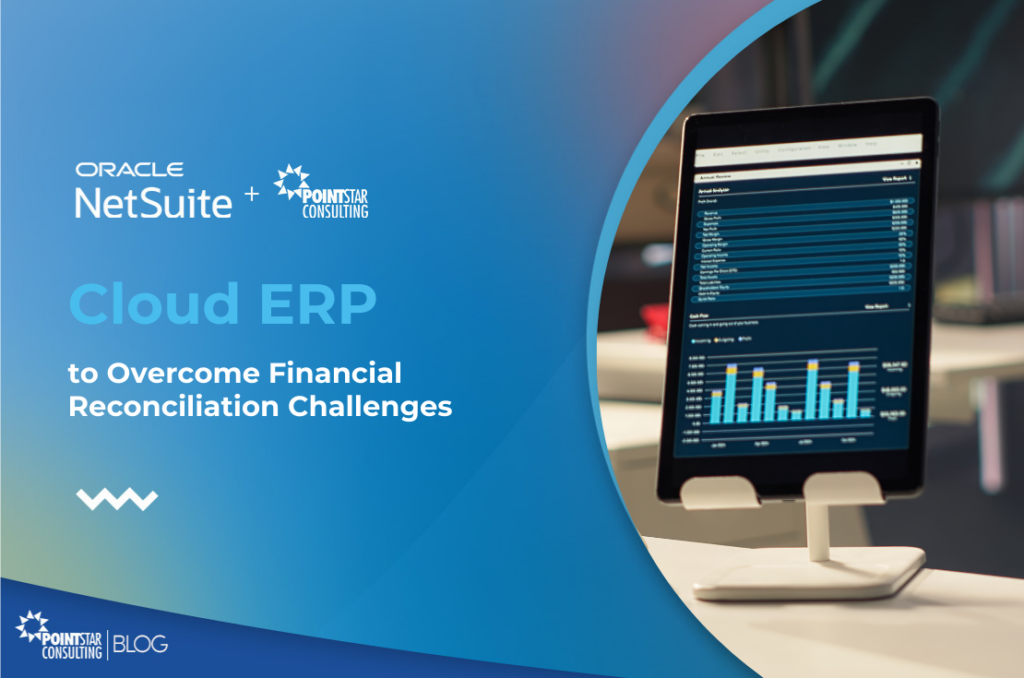Financial reconciliation is a critical process for any business, ensuring that financial records align with bank statements, invoices, and other transactions. However, many organisations struggle with inefficiencies and errors that can disrupt operations and erode trust in financial reporting. Let’s explore the common challenges businesses face with financial reconciliation and how cloud-based ERP systems, like Oracle NetSuite, can provide a modern solution.
The Pain Points of Financial Reconciliation
For many companies, reconciling financial data is a time-consuming and error-prone task.
Here are some of the biggest hurdles:
Manual Processes and Spreadsheets
Relying on spreadsheets for reconciliation is a recipe for mistakes. Data entry errors, version control issues, and lack of real-time updates can lead to discrepancies that take hours – or even days – to resolve. Small businesses, in particular, often lack the resources to streamline these processes, leaving finance teams overwhelmed.
Disparate Systems and Data Silos
When financial data is spread across multiple systems – such as separate accounting, inventory, and payroll platforms – reconciling accounts becomes a nightmare. Without a unified view, businesses struggle to ensure accuracy, and discrepancies can go unnoticed until they snowball into bigger problems.
Delayed Reporting and Visibility
Traditional reconciliation methods often mean waiting until the end of the month to spot issues. This delay can hinder decision-making and expose businesses to risks like cash flow shortages or compliance violations. In fast-moving industries, real-time insights are non-negotiable.
Compliance and Audit Risks
Regulatory requirements demand accurate and transparent financial reporting. Manual reconciliation processes make it harder to maintain audit trails or quickly produce documentation, increasing the risk of penalties or failed audits.
Scalability Issues
As businesses grow, so does the complexity of their financial transactions. Legacy systems or manual processes that worked for a small operation often buckle under the weight of increased volume, leading to bottlenecks and inefficiencies.
How Cloud ERP Systems Solve These Challenges
Cloud-based ERP systems, like Oracle NetSuite, are transforming how businesses approach financial reconciliation. By integrating data, automating processes, and providing real-time insights, these platforms address the pain points head-on. Here’s how:
Automation Reduces Errors
Cloud ERP systems automate repetitive tasks like matching transactions, flagging discrepancies, and generating reports. This minimises human error and frees up finance teams to focus on strategic work rather than chasing down mistakes.
Unified Data for Seamless Integration
A cloud ERP consolidates financial data into a single platform, eliminating silos. Whether it’s accounts payable, receivable, or general ledger entries, everything is accessible in one place, making reconciliation faster and more accurate.
Real-Time Visibility
Dashboards and reports update provided by cloud ERPs offer real-time data. This ensures that discrepancies can be spotted and resolved immediately, not at month-end. This empowers leaders to make informed decisions without delay.
Enhanced Compliance and Audit Readiness
Cloud ERP systems maintain detailed audit trails and ensure compliance with accounting standards. Automated workflows and built-in controls reduce the risk of errors, while easy access to records simplifies audit preparation.
Scalability for Growth
Cloud ERP solutions are designed to scale with your business. Whether you’re expanding into new markets or handling higher transaction volumes, the system adapts without requiring costly overhauls or additional headcount.
Why Oracle NetSuite Stands Out
As a leading cloud ERP provider, Oracle NetSuite offers robust tools to streamline financial reconciliation. Its automated reconciliation features, real-time dashboards, and seamless integration with other business functions make it a game-changer for companies of all sizes. Plus, its cloud-based architecture ensures accessibility from anywhere, enabling remote teams to collaborate efficiently.
In a Nutshell
Financial reconciliation doesn’t have to be a headache. By addressing the challenges of manual processes, data silos, and delayed reporting, cloud ERP systems empower businesses to operate with confidence and precision. Solutions like Oracle NetSuite not only simplify reconciliation but also lay the foundation for long-term growth and compliance.
If your business is struggling with financial reconciliation, it’s time to consider a cloud ERP solution. Reach out to a trusted consultancy like PointStar Consulting to explore how Oracle NetSuite can transform your financial operations.



